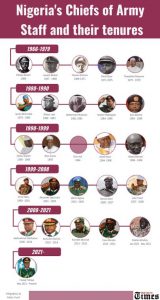

The sudden death of Nigeria’s army chief, Ibrahim Attahiru, penultimate Friday, threw up controversy over who occupies the vacant seat amid a raging security crisis in the country.
There were speculations that Nigeria’s President, Muhammadu Buhari, who has been accused of nepotism in key appointments, would pick Mr Attahiru’s successor from the South-east, one of the regions that have repeatedly accused the president of marginalisation in appointments.
But the debate was again put to rest on Thursday after Mr Buhari appointed Farouk Yahaya, a major general, as the new military boss.
Mr Yahaya replaces Ibrahim Attahiru, a lieutenant general, who was killed in an ill-fated airforce plane crash alongside ten other officers of the army, last Friday in Kaduna.
Until his appointment, the new army chief was the Theatre Commander of Operation Hadin Kai, the counter-insurgency operation in the North-east.
Undoubtedly, the newly appointed army chief has an enormous task ahead. Violent attacks linked to Boko Haram, bandits, kidnappers, armed robbers and vandals have continued to claim lives and properties across the country.
The president has repeatedly promised to tackle the widespread crises, many of which he met in office, but has largely failed like his predecessors.
The Nigerian military is fighting a decade-long insurgency in the North-east while the police, poorly funded and largely under-equipped, are facing a spate of attacks in the South-east and South-south.
Deadly banditry has gripped the North-west and North-central, while ritual killings, carjacking, traffic robberies and so on have continued.
Nigeria has had 26 chiefs of army staff since 1966, the year it experienced its first military coup, one that would define the nation’s political atmosphere for another three decades.
Below is the timeline of the tenures of Nigeria’s army chiefs since the first officer in 1966:
January 1966 – July 1979: The deadly event of January 15, 1966 brought seismic changes to the military and Nigeria’s system of government. The army sacked the civilian administration after killing Prime Minister Tafawa Balewa and top politicians in the country and took power with Aguiyi-Ironsi as the head of state.
TEXEM
It soon became a model that subsequent regimes copied. In the event of Nigeria’s first coup, the military also had its first chief of army staff, Yakubu Gowon. He spent a brief six months there and he was subsequently chosen to become the Head of State in July 1966 after another coup.
Joseph Akahan succeeded Mr Gowon as Nigeria’s army chief shortly before the outbreak of Nigeria’s deadly civil war that killed millions, majority of whom were from South-eastern Nigeria where Biafra was declared an independent state.
Army chiefs
At the heat of the civil war, Hassan Katsina, a major general, was appointed as the chief of army staff in 1968, a position he held for almost three years.
David Ejoor succeeded him in 1971.
Following his promotion to General Officer Commanding (GOC), Theophilus Danjuma became the chief of army staff to the head of state Olusegun Obasanjo in 1975. Mr Danjuma is the fourth longest-serving chief of army staff.
October 1979 – August 1990: Ipoola Akinrinade succeeded Mr Danjuma as the chief of army staff in 1979. He served as the first army chief in Nigeria’s Second Republic. Mr Akinrinade was appointed as the chief of defence staff in 1980 before his voluntary retirement in 1981.
ADVERTISEMENT
Gibson Jalo, a lieutenant general, replaced Mr Akinrinade as the military chief. Mr Jalo had held several positions in the military before his appointment. He served under the Shehu Shagari administration.
In 1981, Mohammed Wushishi was appointed as the chief of army staff having chaired several councils in the military command. He was required to retire in January 1984 after the 31 December coup in which General Muhammadu Buhari came to power.
Ibrahim Babangida took over as army boss after orchestrating the coup d’etat of 1983 and 1985. Mr Babaganda, nicknamed Maradona, was a ringleader and commanded respect at the highest levels of the army. He spent less than two years as the chief of army staff before he led a coup to topple Mr Buhari in 1985.
Once Mr Babangida seized power, Sani Abacha, a close ally of his, was appointed as the chief of army staff.
Mr Abacha later served as a defence minister in 1990 under the same Babangida regime. Until his death in 1998, Mr Abacha was involved in all the military coups in Nigeria.
August 1990 – 1999: Mr Abacha ceded his position to Salihu Ibrahim in 1990. Unlike Messrs Abacha and Babangida, Mr Ibrahim was less influential. He was unable to assert much authority because Mr Abacha refused to vacate the traditional residence of the chief of army staff.
Aliyu Gusau and Chris Alli are other members of Mr Babangida’s crew that served as army chiefs between 1993 and 1994. Mr Gusau spent a short spell and was accused of financial misappropriation while Mr Alli was dismissed as the chief of army staff.
Similarly, Alwali Kazir and Ishaya Bamaiyi held the position under the Abacha regime. Mr Bamaiyi retired in 1999 at the inception of Nigeria’s fourth republic.
May 1999 – September 2010: The restoration of democracy in 1999 saw the installation of Victor Malu as the chief of army staff. He was dismissed in 2001 by President Olusegun Obasanjo. Mr Malu alleged that Americans disliked his views and therefore influenced Mr Obasanjo to fire him before signing the Nigerian-United States Military Cooperation Agreement.
Aside from Mr Malu, President Obasanjo appointed three chiefs of army staff under his administration. They include Alex Ogomudia, Martin Agwai and Owoye Azazi.
Mr Azazi had a fast career growth in the military. Between May 2006 and June 2007, he rose to the rank of major general, lieutenant-general and general.
Less than one month into his inauguration as Nigeria’s president, Umaru Yar’Adua appointed Luka Yusuf as chief of army staff. Mr Yusuf retired after a scandal involving the sale of arms to militants from the central command depot, Kaduna armory, which was under his command.
In 2008, Mr Yar’Adua appointed Abdulrahman Dambazau as the chief of army staff. Under his watch the military was accused of attempts to covertly seize power due to Mr Yar’Adua’s sickness. Mr Dambazau was retired from service by President Goodluck Jonathan in 2010.
September 2010 – May 2021: Mr Jonathan appointed Azubuike Ihejerika as the army chief to serve between 2010 and 2014. He became the first chief of army staff from the South-east since the end of the civil war in 1970.
In 2014, Mr Jonathan appointed Kenneth Minimah to replace Mr Ihejerika as the chief of army staff.
Tukur Buratai, Nigeria’s longest-serving chief of army staff, was appointed in July 2015 by President Muhammadu Buhari. Mr Buratai’s tenure as army chief has been characterised by some successes against Boko Haram, but it was also filled with massive extrajudicial killings of hundreds of Nigerians by soldiers under his watch.
PREMIUM TIMES reported that the majority of the soldiers and officers involved in the extrajudicial killings were never prosecuted or punished for their crimes.
Meanwhile, in one of the cases, the army murdered hundreds of members of Shiite group in Zaria and said it did so because they had blocked a road being used by Mr Buratai and thus endangered his life in 2015.
Mr Buratai, a lieutenant general, resigned in January 2021.
Long before his resignation, security experts, opposition and federal lawmakers advised the president to fire him alongside other service chiefs.
President Muhammadu Buhari appointed Mr Attahiru as the 25th chief of army staff on January 26 alongside other service chiefs including the Chief of Defence Staff, Lucky Irabor; Chief of Naval Staff, Gambo Awwal, and Chief of Air Staff, Isiaka Amao.
Mr Attahiru died four months after being appointed to the post.
Mr Attahiru, 54, was killed along with 10 others including aides and crew when the aircraft they were travelling in crashed in Kaduna.
President Buhari Thursday approved the appointment of Farouk Yahaya as the 22nd chief of army staff.
Prior to his appointment, Mr Yahaya, a major-general, had served as the General Officer Commanding 1 Division of the Nigerian Army and was the incumbent Theatre Commander of the military outfit in the North-east code-named Operation Hadin Kai.
(Source: Premium Times)


Leave a Reply